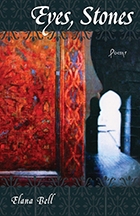 Elana Bell. Eyes, Stones. Louisiana State University Press, 2012. 64 pgs. $17.95.
Elana Bell. Eyes, Stones. Louisiana State University Press, 2012. 64 pgs. $17.95.
Reviewed by Lynn Domina
Elana Bell’s first collection, Eyes, Stones, caught my attention in part because of its content: it explores relationships between Jewish and Palestinian people, each bearing hope for the land, each suffering enormously. Bell is herself a descendant of the Holocaust, but the poems are marked by compassion not only for Jews inside and outside of Israel but also for the Palestinians who have been displaced by Israel. The poems are not polemical in the narrowest sense of that word, but they are political. And they are also artful. I’ve repeatedly returned to this book, especially in recent weeks, and the poems return to me as I pull weeds from my garden, open my cupboard doors, go about my day. Bell’s skill with metaphor, image, syntax, and voice guarantee that these poems will be memorable.
The poems are often both allusive and elusive; they suggest rather than explain (some brief notes at the end of the book are sufficient to assist readers who need more historical context). The collection includes several short prose poems and one ghazal, but most of the poems are written in free verse. Yet stylistically the book is exceptionally diverse; Bell is able to select forms that best suit individual poems. I appreciated the book’s range which allows multiple entry points into the collection’s thematic concerns.
Although many of the poems are comparatively brief (frequently shorter than a dozen lines), I would first like to comment on one of the longest poems, “On a Hilltop at the Nassar Farm.” On the page, this poems looks deceptively conventional; it’s arranged into five fairly even stanzas, interrupted by one stanza of a single line, each stanza developing a bit of narrative as a prose paragraph would. The poem begins with a straightforward declarative sentence, but Bell backtracks later in the sentence to clarify that an idea that seems straightforward contains more meaning, more significance, than readers, especially American readers, would ordinarily assume. Here is the first stanza:
This is for Amal, whose name means hope,
who thinks of each tree she’s planted like a child,
whose family has lived in the same place
for a hundred years, and when I say place
I mean this exact patch of land
where her father was born, and his father,
so that the shoots he planted before her birth
now sweep over her head. Every March
she plucks the green almonds and chews
their sour fuzzy husks like medicine.
Bell’s strategy for the entire poem is embedded in this stanza: “when I say place / I mean…” The speaker understands that the reader won’t interpret these words as literally as they are intended. “Place” doesn’t mean this general area; it means this specific plot of land. Later, she says, “Amal loves this land / and when I say land I mean this / exact dirt and the fruit of it…” The speaker contrasts her own family’s itinerant history with the stability of Amal’s family. She conveys the longing of both “for that place / where we had taken root once.” This poem is remarkably empathic, willing to acknowledge the historical complexity of multiple desires for this particular land.
Stylistically quite different from “On a Hilltop at the Nassar Farm” is “Visiting Auschwitz.” This poem’s orderly arrangement in couplets suggests such civility, which would be an ironic comment on its content, but the poem is also disorderly, entirely lacking punctuation and capitalization. The poem tells the story of one woman’s survival through coincidence and accident, but it is memorable through its images. It opens with three anaphoric lines that could be questions as easily as statements (and so, given the absent punctuation, function as both): “what extra scrap of bread / what glance from a slop-drunk SS // what rage raised the rusted shovel / struck it on the starving ground.” The word choice here encourages meaning to compound. The SS man may be “slop-drunk,” but “slop” connotes the food of pigs, food only desperate human beings would eat. The ground is “starving,” but so, obviously, did millions of human beings. These four lines contain a total of twenty-four words (counting “SS” as one word); of these, all but four are monosyllabic, and the insistent rhythm provoked by these monosyllables is enhanced through the assonance and alliteration. Bell obviously understands how many factors of a language contribute to its meaning, and she understands also how to convert language into poetry.
I have not yet spoken of my favorite poem in the collection, a five-part sequence called “What Else God Wanted.” This poem describes the scriptural origin of the Israeli-Palestinian conflict, with Abraham as its founding father. This poem occurs approximately one-third of the way through the collection, and its placement demonstrates Bell’s attention to the fact that she’s publishing a book, not simply a group of poems. “What Else God Wanted” is preceded by a poem called “God” in which God is, at best, not very relevant, and it is followed by a poem called “Bastard,” set in the near-present but obviously also commenting on the relationships among Ishmael and Isaac, Abraham, Sarah and Hagar.
It’s hard to say I enjoyed this book, for it is too somber for that kind of pleasure. But I will say I admire it. I will say I wish you all would read it.
